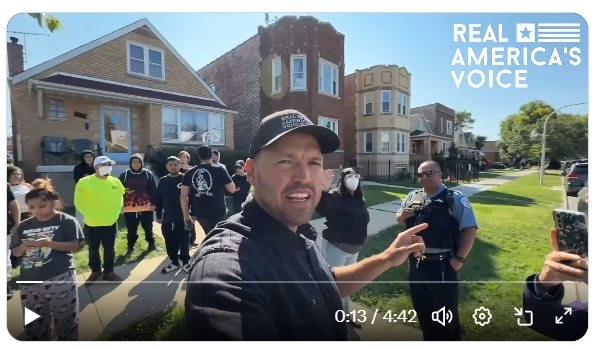Ben Bergquam’s Law & Border cameras caught a raw confrontation during an ICE operation in Chicago. As federal agents targeted a criminal illegal alien with multiple charges, local activists mobilized to block the arrest, calling in police and swarming Bergquam with threats and insults. Instead of defending their neighborhoods, they defended the very criminals destroying them—proving why sanctuary city policies turn law enforcement into theater and leave communities at risk.
On Chicago’s streets, law enforcement wasn’t just up against criminals—it was up against willful blindness. Ben Bergquam, host of Law & Border on Real America’s Voice, rode with ICE as agents executed an arrest on an illegal alien convicted of violent crimes. But what should have been a straightforward operation turned chaotic when local activists showed up to obstruct it.
Bergquam described the scene as “sickening.” The crowd, agitated and hostile, swarmed him, shouting profanities and flipping him off while ICE agents attempted to secure the area. “How many criminals do you want in your neighborhood?” he asked them directly. “Are you okay with rapists? Are you okay with murderers?” Instead of answering, protesters hurled insults, blocked traffic, and even called in the Chicago Police Department (CPD).
WATCH:
Here lies the tragedy: CPD was not there to assist ICE, but to respond to the activists’ complaints. Chicago’s sanctuary city laws forbid cooperation with federal immigration enforcement, which means ICE can’t simply pick up dangerous offenders from city jails. Instead, agents must hunt them down in neighborhoods, creating exactly the kind of scenes Bergquam filmed.
“Look at the response by CPD,” Bergquam said in the footage. “If ICE could just go to the jails, you wouldn’t have to have this. But because the mayor won’t let them, ICE has to come out here. Then you get these leftist activist groups that obstruct, and the criminal stays in the community.”
The irony is brutal. Chicago politicians claim sanctuary policies protect immigrant communities, yet the result is that convicted armed robbers, drunk drivers, and even cartel-linked criminals remain at large. Bergquam pointed out that these offenders often prey on other undocumented immigrants as much as they do citizens. By obstructing ICE, activists aren’t defending their neighbors—they’re protecting predators.
Telemundo cameras showed up at the scene as well, leaving Bergquam to wonder how the mainstream media would spin it. Would they highlight ICE removing criminals from the streets? Or would they lionize the protestors as noble “resisters”? The pattern is familiar: activists obstruct law enforcement, politicians defend the obstruction, and media outlets sanitize the chaos.
Bergquam didn’t mince words about what he witnessed. Calling the protestors “the enemies within our founders warned us about,” he framed the standoff as part of a larger cultural war. For him and many in the America First movement, sanctuary cities aren’t just misguided—they are deliberately dangerous, sabotaging law enforcement in order to score political points.
The episode underscores a grim reality: in cities like Chicago, ideology trumps safety. Leaders like Mayor Brandon Johnson double down on sanctuary status, activists flood the streets to block arrests, and the same neighborhoods plagued by violence remain unprotected.
As Bergquam put it: “Very simple message from me to you—screw you, we’re sending him home.”
Make sure to watch Berngquam’s Law and Border on Real America’s Voice for more:
